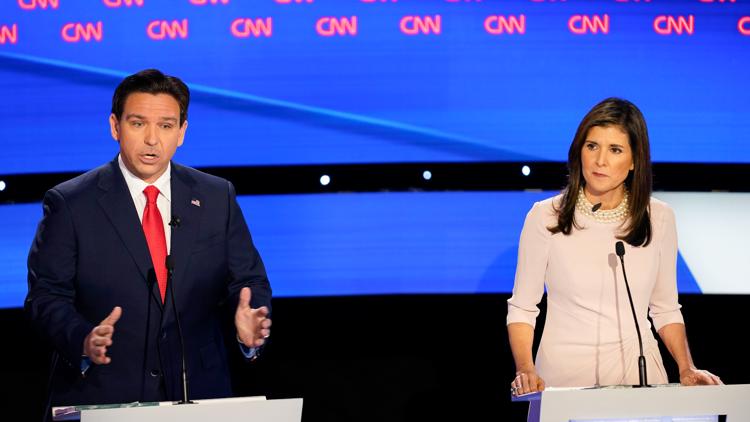On Wednesday, Jan. 10, former U.N. ambassador Nikki Haley and Florida Gov. Ron DeSantis participated in the first one-on-one presidential primary debate of the election cycle.
Former President Donald Trump, who has skipped all of the debates so far, appeared at a separate town hall with Fox News.
After former New Jersey Gov. Chris Christie’s decision to drop out of the 2024 presidential race, DeSantis, Haley and Trump are among the five candidates that remain in the Republican primary field. Haley, DeSantis and Trump qualified for the Jan. 10 debate.
Despite the separate events, all three candidates touched on similar topics, including immigration, national debt and Social Security.
VERIFY fact-checked these claims from the debate between Haley and DeSantis, and Trump’s town hall.
THE CLAIM
DeSantis: “I beat the left by banning China from buying land in Florida.”
THE SOURCES
THE ANSWER
Yes, Florida Governor Ron DeSantis did sign a law that bans Chinese government entities and most Chinese citizens from buying land in Florida.
WHAT WE FOUND
DeSantis is referring to Florida Senate Bill 264, which he signed into law in May 2023.
The law restricts people who are from China, Russia, Iran, North Korea, Syria, Cuba and Venezuela and do not have U.S. citizenship from buying certain kinds of land, such as agricultural land and land near military bases, in Florida.
A portion of the law, however, outlines stricter rules for Chinese officials, members of the Chinese Communist Party, Chinese businesses and organizations and people who live in China and are not citizens or lawful permanent residents of the United States.
The law says this group of people may not "directly or indirectly own… real property in this state.”
“Real property” is a term that refers to land, its structures and its minerals, the Cornell Law School’s Legal Information Institute says.
Chinese citizens living in Florida sued the state in an attempt to halt the law. The lawsuit is currently ongoing.
THE CLAIM
Trump: “Nikki Haley wanted to raise the [Social Security and Medicare retirement] age from 65 to 74 [or] 75.”
THE SOURCES
- Nikki Haley’s August 2023 interview with Bloomberg on YouTube
- Haley’s comments during the presidential primary debate with DeSantis on Jan. 10, 2024
THE ANSWER
Nikki Haley said she supports raising the retirement age for younger Americans – not everyone. She had not said what the new retirement age should be.
WHAT WE FOUND
Currently, people can begin receiving Social Security benefits as early as age 62. But they are entitled to all of their benefits when they reach their full retirement age, which is 66 to 67 depending on a person’s birth year .
Medicare is federal health insurance that is generally available for people 65 and older.
Haley has said on multiple occasions that she supports changing the retirement age for Americans who are currently in their 20s.
She has not said the retirement age should be raised for all Americans.
“We don’t touch anyone’s retirement or anyone who’s been promised in, but we go to people like my kids in their 20s when they’re coming into the system and we say, ‘The rules have changed. We changed retirement age to reflect life expectancy,’” Haley said during an August 2023 interview with Bloomberg.
Haley doubled down on her position about raising the retirement age for people in their 20s during the debate on Jan. 10, 2024.
“I said [the retirement age] is too low if we’re going to look at those in their 20s,” Haley said during the debate.
Haley has not said what the new retirement age should be, as Trump suggested.
THE CLAIM
DeSantis: “Trying to afford a new home today, your monthly mortgage payment will probably be twice as much as what it would’ve been if you were starting out five years ago.”
THE SOURCES
THE ANSWER
No, the average monthly mortgage payment is not twice as much as it was five years ago.
WHAT WE FOUND
While the average monthly mortgage payment nationwide has risen considerably, it is not double what it was five years ago.
The average mortgage payment from the fall of 2023 was just over $3,000 a month, according to data from the Federal Reserve, Freddie Mac, and the National Association of Realtors.
Exactly five years earlier, the average mortgage payment was $1,750 a month. That’s about 58% of $3,000. Half would be $1,500.
THE CLAIM
Haley: “[Ron DeSantis] ran on wanting to ban fracking.”
THE SOURCES
- Ron DeSantis’ 2018 campaign website archived on the Wayback Machine
- Florida Governor’s Office
- July 31, 2023 DeSantis press event
THE ANSWER
Yes, Ron DeSantis ran for governor of Florida on a platform that included a ban on fracking.
WHAT WE FOUND
DeSantis’ 2018 campaign website stated that DeSantis would “work to ban fracking in the state of Florida,” according to an archive of the website available on the Wayback Machine.
“With Florida’s geological makeup of limestone and shallow water sources, fracking presents a danger to our state that is not acceptable,” the Republican Party of Florida wrote on rondesantis.com. “On day one, Ron DeSantis will advocate to the Florida Legislature to pass legislation that bans fracking in the state.”
Two days after he became governor, DeSantis directed Florida’s Department of Environmental Protection to “take necessary actions to adamantly oppose all off-shore oil and gas activities off every coast in Florida and hydraulic fracturing in Florida.”
The governor’s order was not a definitive ban on fracking in Florida, and the state legislature has yet to pass any laws that would ban or limit fracking.
As a presidential candidate, DeSantis has said he would not support any federal bans on fracking.
THE CLAIM
DeSantis: “[Nikki Haley] is somebody that wrote in her book that Hillary Clinton inspired her to first run for office. I remember Hillary denigrating people on the Republican side as deplorables. We don't need a candidate who is going to look down on Middle America.”
THE SOURCES
- With All Due Respect, Nikki Haley’s 2019 memoir
- Haley interview with The New York Times in 2012
- Haley interview with American University’s Women & Politics Institute in 2020
THE ANSWER
Haley has said on numerous occasions that a speech in which Clinton encouraged women to run for office helped clinch her own decision to enter politics, but that she disagrees with Clinton ideologically.
WHAT WE FOUND
In her 2019 memoir With All Due Respect, Nikki Haley wrote, “I… met [Hillary Clinton]... at a women’s professional event in Greenville, South Carolina. At that event, she inspired me to run for office and make my voice heard.”
On the same page, she also makes clear her ideological opposition to Clinton: “I couldn’t get past many of her problems and policies I thought were bad for the country… I had reservations about Donald Trump, but I had more about Hillary Clinton. I didn’t feel bad at all voting against someone who would have been the first female president.”
In a 2012 interview with The New York Times, Haley elaborated on what specifically Clinton said to inspire her: “Everybody was telling me why I shouldn’t run: I was too young, I had small children, I should start at the school board level… Hillary Clinton… said that when it comes to women running for office, there will be everybody that tells you why you shouldn’t but that’s all the reasons why we need you to do it, and I walked out of there thinking ‘That’s it. I’m running for office.’”
Haley shared the same anecdote in a 2020 interview with American University’s Women & Politics Institute, this time reiterating her political differences with Clinton: “I often say that the reason I got into politics, believe it or not – I don’t agree with anything she has to say – but [it] was because of Hillary Clinton.”
THE CLAIM
Trump: “[New Hampshire allows] Independents and Democrats to vote in the Republican primary.”
THE SOURCES
THE ANSWER
Trump’s comment about voting in a presidential primary in New Hampshire is misleading.
New Hampshire allows only undeclared voters to vote in either party’s presidential primary election. But voters who are registered with one party cannot vote in another party’s primary.
WHAT WE FOUND
In New Hampshire, registered voters can only vote in the presidential primary for the party they are registered for.
If a voter is not registered with a party, they are considered an undeclared voter. Those people, who are often called “independent” voters, can choose which party’s primary to vote in, according to the Secretary of State.
Trump’s comment is misleading because it implies that any Independent or Democrat can vote in the state’s Republican primary, and that will skew the results. But that’s false.
Only undeclared voters can choose which presidential primary to vote in. But a registered Democrat can’t cross over and vote in New Hampshire’s Republican primary, the National Conference of State Legislatures explains.
In New Hampshire, once an undeclared voter votes in a party’s primary, their affiliation is also changed to that party.
Roughly 40% of New Hampshire voters are undeclared, according to Liz Tentarelli, the president of the League of Women Voters New Hampshire.
The undeclared voters in New Hampshire are part of the reason why New Hampshire plays a large role in setting the tone for other primaries and the presidential election, Tentarelli added.
THE CLAIM
Haley: “[Ron DeSantis] promised not to raise the debt limit when he got to DC, yet he raised the debt limit by hundreds of billions of dollars.”
THE SOURCES
U.S. Congress
U.S. House Clerk
2012 Florida congressional candidate forum held by the League of Women Voters and St. Augustine Record
THE ANSWER
As a congressional candidate in 2012, Ron DeSantis said he would not raise the debt limit if he was elected. In 2018, he voted for a budget that suspended the debt limit, effectively raising it by more than a trillion dollars.
WHAT WE FOUND
Before he was governor of Florida, Ron DeSantis served three terms in the U.S. House of Representatives, first elected in 2012. During that campaign, DeSantis participated in a local candidate forum, in which candidates were asked if they would vote to raise the debt ceiling.
“I'm not going to raise the debt ceiling. We need to force Congress to make tough choices,” DeSantis answered.
But once he was in office, DeSantis voted for the Bipartisan Act of 2018, a law later signed by President Trump.
Among other provisions, the act suspended the debt limit. According to the Congressional Research Service and the Committee for a Responsible Federal Budget, this effectively raised the limit by more than $1.5 trillion.
DeSantis did vote against a similar budget proposal that included a debt ceiling suspension in 2015, when Barack Obama was president.



